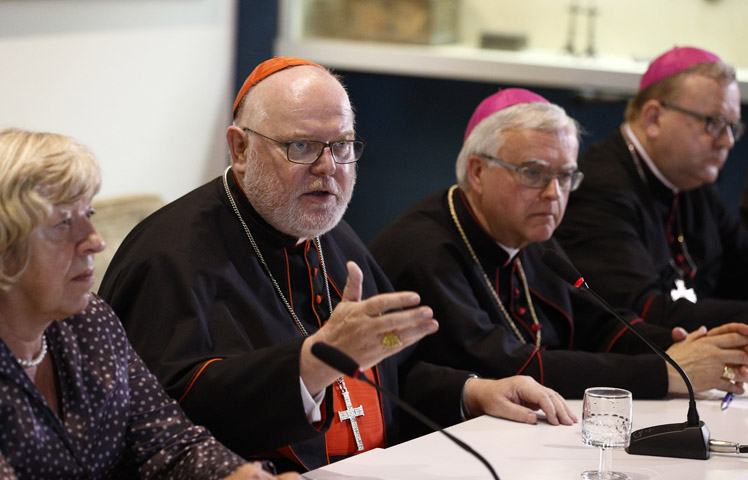
Cardinal Reinhard Marx of Munich-Freising, president of the German bishops' conference, and other German bishops and a lay synod observer, hold a press conference at the Vatican after the opening session of the Synod of Bishops on the family at the Vatican Oct. 6. (CNS/Paul Haring)
In his statement in the second week of the synod -- published in German by the German bishops' conference on Oct. 16 -- Cardinal Reinhard Marx put in a strong and moving plea to allow divorced and remarried Catholics who played an active role in their parishes to be allowed to receive the sacraments under certain conditions and only after considering each individual case.
For many of the Catholic faithful, the question of whether the church could heal sinners without the sacrament of reconciliation called the church's credibility into question, he said. That was why finding an appropriate way of dealing with those faithful whose first marriages had broken down and who had remarried was one of the greatest challenges facing the church in its pastoral work with families today.
"With a view to divorced and remarried Catholics who take an active part in parish life, many faithful ask why the church without exception refuses to let them partake of Communion," Marx said. "They cannot understand how one can belong to the full community of the church and yet be excluded from the sacraments of reconciliation and the Eucharist. The reason given is that divorced and remarried people are in an objectively adulterous situation and therefore contradict what the Eucharist symbolically represents, namely Christ's loyalty to His church.
"But does this explanation do justice to the situation of those concerned? And is it mandatory from the sacramental-theological point of view? Can people who are seen to be in a state of grave sin really have the feeling of fully belonging to us?"
Two essential points had to be considered, Marx said. First, could the church refuse people reconciliation with God and the sacramental experience of God's mercy, even if they really and honestly repented their share in the breakdown of their first marriage? And second, it was essential to remember that the Eucharist did not only represent Christ's union with His church but continually renews this union and strengthens the faithful on their way to sanctification.
"These two principles of admission to the Eucharist, namely witnessing the unity of the church and participating in the means of grace, can occasionally be mutually contradictive," Marx said, quoting from the Second Vatican Council's Decree on Ecumenism by way of illustration: "The expression of unity generally forbids common worship. Grace to be obtained sometimes recommends it."
In Evangelii Gaudium, Pope Francis had supplemented the above statement, Marx pointed out: "The Eucharist, although it is the fullness of sacramental life, is not a prize for the perfect but a powerful medicine and nourishment for the weak. These convictions have pastoral consequences that we are called to consider with prudence and boldness."
Based on the theological foundation laid down by the Second Vatican Council, Marx said "we should seriously examine the possibility -- always with regard to each individual case and not generally -- of admitting divorced and remarried people to the sacraments of reconciliation and Communion under the following conditions: the canonically valid first marriage has definitely broken down and cannot be annulled, the liabilities of this first marriage have been clarified, blame for the breakdown has been admitted and faults repented, and there is an honest intention to live by the faith in the second, civil marriage and to bring up the children in the faith."
[Christa Pongratz-Lippitt is the Austrian correspondent for the London-based weekly Catholic magazine The Tablet.]
